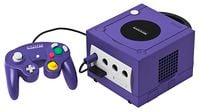Nintendo GameCube: Difference between revisions
(→Trivia: "Close" is subjective, so I'm removing this altogether.) |
mNo edit summary |
||
| Line 1: | Line 1: | ||
{{ArticleIcons|ssbm=y}} | {{ArticleIcons|ssbm=y}} | ||
{{Infobox Game System | {{Infobox Game System | ||
|title | |title = Nintendo GameCube | ||
|logo | |logo = [[File:GameCube logo.png|200px]] | ||
|image= [[Image:Nintendo_GameCube.jpg|200px|Nintendo GameCube]] | |image = [[Image:Nintendo_GameCube.jpg|200px|Nintendo GameCube]] | ||
|manufacturer = [[Nintendo]] | |manufacturer = [[Nintendo]] | ||
|type | |type = Video game console | ||
|generation | |generation = [[wikipedia:History of video game consoles (sixth generation)|Sixth generation]] | ||
|lifespan | |lifespan = {{Flag|Japan}} September 14, 2001 <br> {{Flag|NA}} November 18, 2001 <br> {{Flag|Europe}} May 3, 2002 <br> {{Flag|Australia}} May 17, 2002 | ||
|CPU | |CPU = [[wikipedia:IBM|IBM]] [[wikipedia:PowerPC|PowerPC]] [[wikipedia:Gekko (microprocessor)|"Gekko"]], 486 MHz | ||
|GPU | |GPU = [[wikipedia:ATI Technologies|ATI]] "Flipper", 162 MHz | ||
|media | |media = 4 cm optical disc | ||
|storage | |storage = Nintendo GameCube Memory Card | ||
|controllers | |controllers = Nintendo [[Gamecube controller]] | ||
|connectivity | |connectivity = Nintendo GameCube Broadband Adapter and Modem Adapter | ||
|predecessor = [[Nintendo 64]] | |||
|predecessor = [[Nintendo 64]] | |successor = [[Wii]] | ||
|successor | |interwiki = nwiki | ||
|interwiki | |interwikiname = Nintendo Wiki | ||
|interwikiname | |interwikipage = Nintendo GameCube | ||
|interwikipage | |||
}} | }} | ||
The '''Nintendo GameCube''' ({{ja|ニンテンドーゲームキューブ|Nintendō GēmuKyūbu}}, ''Nintendo GameCube''), often abbreviated '''GCN''', is the fourth gaming console released by Nintendo in 2001. ''[[Super Smash Bros. Melee]]'' is one of its games, and its top-seller. | The '''Nintendo GameCube''' ({{ja|ニンテンドーゲームキューブ|Nintendō GēmuKyūbu}}, ''Nintendo GameCube''), often abbreviated '''GCN''', is the fourth gaming console released by Nintendo in 2001. ''[[Super Smash Bros. Melee]]'' is one of its games, and its top-seller. | ||
Revision as of 21:24, August 6, 2017
| Nintendo GameCube | |
|---|---|
 File:GameCube logo.png | |
| Manufacturer | Nintendo |
| Type | Video game console |
| Generation | Sixth generation |
| First available | |
| CPU | IBM PowerPC "Gekko", 486 MHz |
| GPU | ATI "Flipper", 162 MHz |
| Media | 4 cm optical disc |
| System storage | Nintendo GameCube Memory Card |
| Controller input | Nintendo Gamecube controller |
| Connectivity | Nintendo GameCube Broadband Adapter and Modem Adapter |
| Predecessor | Nintendo 64 |
| Successor | Wii |
| Article on Nintendo Wiki | Nintendo GameCube |
The Nintendo GameCube (ニンテンドーゲームキューブ, Nintendo GameCube), often abbreviated GCN, is the fourth gaming console released by Nintendo in 2001. Super Smash Bros. Melee is one of its games, and its top-seller. Its successor, the Wii, is backward compatible with the Nintendo GameCube; capable of playing all of its games and accepting its controllers and Memory Cards. Various Wii games have allowed use of a Nintendo GameCube controller as a way to have a more traditional way to play, including Super Smash Bros. Brawl. The control scheme in Super Smash Bros. Brawl works much like it did in Super Smash Bros. Melee.
General Information
The Nintendo GameCube is unique in that its discs are smaller than any other game disc, utilizing a proprietary variant of the 8 cm MiniDVD. The controller features a considerably different layout from the Nintendo 64 controller. The C-buttons are replaced with a C-Stick which is identical in function, its shoulder buttons are pressure-sensitive, and sports a new binary wing grip design as opposed to the Nintendo 64 controller's ternary wing grip design, along with many other differences. It is the first Nintendo console to introduce online play, although in an extremely limited, decentralized manner. The system sold 21.74 million units worldwide.
In the Super Smash Bros. series
Cameo
The Nintendo GameCube appears within Super Smash Bros. Melee as a trophy, with its description breaking the fourth wall. It also appears as a platform in Luigi's Target Test in Melee in the center of the stage. In addition, the background of the Trophy Hoard room in Melee contains a Gamecube (with controller) along with several other gaming implements, including a Game & Watch handheld, a GameBoy and an N64 containing a copy of the original Super Smash Brothers.
Trophy description
Nintendo's latest bundle of joy arrived in North America on November 18, 2001, and video-game fans rejoiced. This little beauty is sleek, compact and full of cutting-edge technology. Incorporating optical media for the first time, the Nintendo GameCube was truly born to play. Rumor has it that Super Smash Bros. Melee is a software title for this wondrous device.
Nintendo's latest bundle of joy arrived in Europe in May 2002, and video-game fans rejoiced. This little beauty is sleek, compact and full of cutting-edge technology. Incorporating optical media for the first time, the Nintendo GameCube was truly born to play. Rumor has it that Super Smash Bros. Melee is a software title for this wondrous device.
Gallery
- Gamecube Startup Screen.gif
The startup screen of the GameCube.
| Nintendo consoles | |
|---|---|
| Home consoles | Color TV-Game 15 · Nintendo Entertainment System · Super Nintendo Entertainment System · Virtual Boy · Nintendo 64 · Nintendo GameCube · Wii · Wii U |
| Handheld consoles | Game & Watch · Game Boy · Game Boy Color · Game Boy Advance · Nintendo DS · Nintendo 3DS |
| Hybrid consoles | Nintendo Switch |


